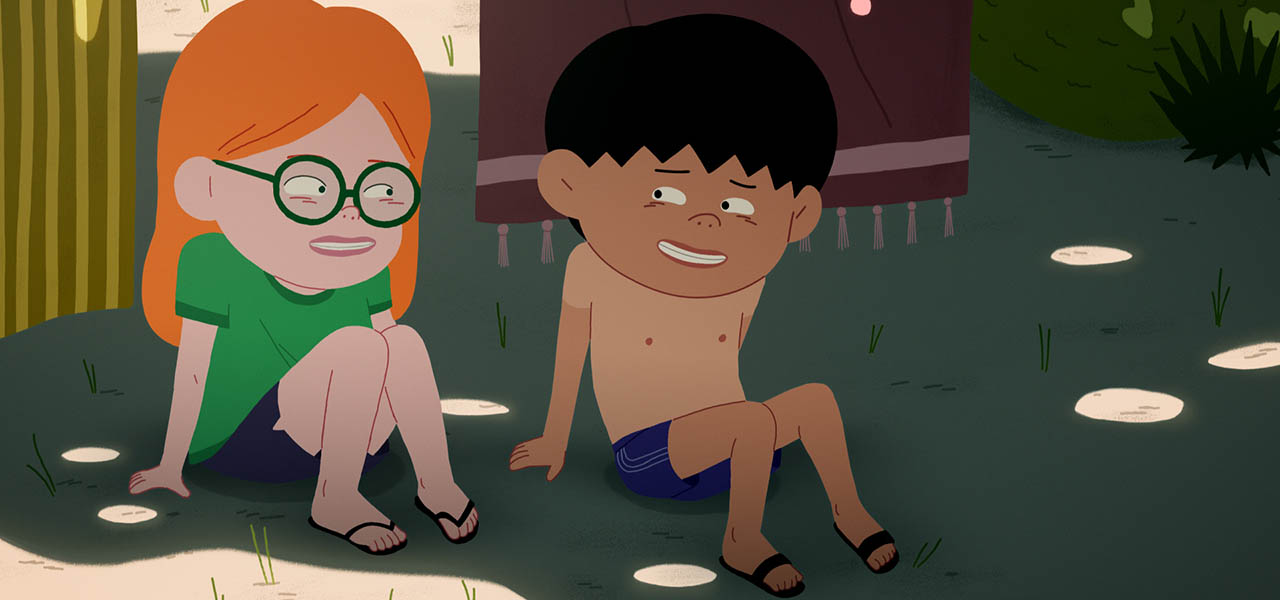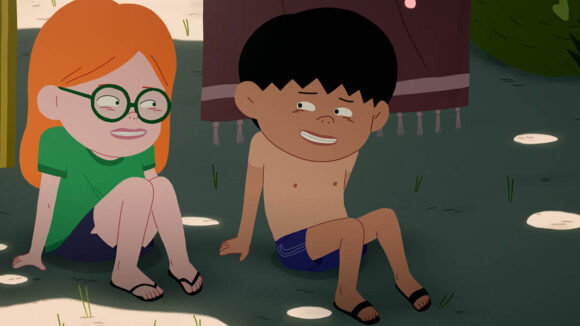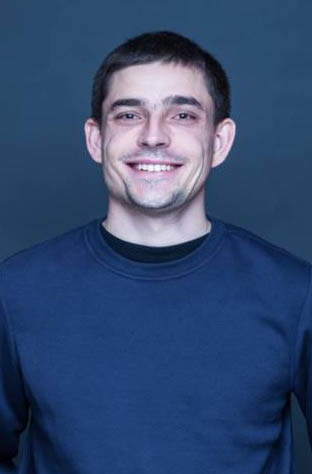

2025 Oscar Contenders: ‘Yuck!’ Director Loïc Espuche
Welcome to Cartoon Brew’s series of spotlights focusing on the animated shorts that have qualified for the 2025 Oscars. The films in this series have qualified through one of multiple routes: by winning an Oscar-qualifying award at a film festival, by exhibiting theatrically, or by a Student Academy Award.
Today’s film is Yuck! (or Beurk! in its original title) from French filmmaker Loïc Espuche and production company Ikki Films, in co-production with Iliade et Films. The short earned its Oscars qualification through theatrical exhibition.
In Yuck!, a group of kids witness young and old adults kissing in public during their campsite holidays. For Léo and his friends, there’s nothing more disgusting. And the worst thing is, you can’t miss it: when people are about to kiss, their lips turn a glossy pink. That’s when things start to get complicated for Léo. Because even if he laughs at those ugly kissers, Léo secretly wants to give it a try too.
Cartoon Brew: On the festival circuit, your film has won numerous audience awards, often from young audiences. Why do you feel this film has connected so well with children?

Loïc Espuche: It’s a film that really gets young audiences going. I remember a couple of screenings when the kids were screaming so much I couldn’t even hear the sound of the film. I’m happy because the kids react like the characters in the film, full of ambivalence about the kisses they see.
I think they’re also happy to see films that talk about themselves and about a taboo subject that concerns them. In discussions after screenings, I often get lots of questions from children, and it’s great to see that Yuck! allows them to discuss the themes of the film in their own words. But I don’t think it’s a story just for kids. In fact, it’s also won several audience awards from adults, and I get a lot of reactions from them during screenings. For me, it was really important to make a film that could appeal to young and older viewers alike.
This film was partly inspired by the shyness that I felt as a child, and sometimes still feel today. I was also a very observant little boy, which is why the notion of gaze is also present in the staging of this story. I think that when you’re little, you’re very much influenced by the way others look at you, but also by the way you look at the world around you. For me, it’s more a film about childhood than a film for children.
What was it about this story or concept that connected with you and compelled you to direct the film?
I got the idea during a screening of my previous short film Mutation, a story about a soldier who goes off to war and at the very beginning of the film, he says goodbye to his fiancée and gives her a little kiss. It was in a cinema full of children, and at that point, all the kids in the audience started shouting, “Aaaah, yuck! They’re going to kiss! I’m not looking!” It was so funny to see these reactions, and that’s when I said to myself, I absolutely have to make a film about kissing, and the mixed feelings of disgust and fascination it creates for kids. I quickly realized that the concept of a pink mouth symbolizing the desire to give a kiss, which contrasts with the children’s voices shouting “Yuck!,” allowed me to explore themes such as the birth of feelings and the fear of other people’s gaze, but also the notion that everyone had a secret garden, in a playful and humorous way.
What did you learn through the experience of making this film, either production-wise, filmmaking-wise, creatively, or about the subject matter?
For me, one of the main discoveries of this film was learning to let the unexpected find its place in the conception of an animated film. This was particularly true during the recording of the children’s voices, which we did without animatics so as to leave them free to find their own rhythm and bring out something very singular.
Yuck! also marked the first time I’d worked with such a large animation team, because there were so many characters per shot, and we had to pay particular attention to the acting. This also made me really understand the importance of layout. For that stage, Léo Schweitzer [head of animation] and I drew a lot of inspiration from the book Studio Ghibli Drawings. It was a real source of inspiration for us, and even if we’re still a long way from mastering their level, we made a lot of progress between the beginning and end of Yuck!’s layout.
I also felt very strongly the importance of the human aspect during this shooting. Basically, the film has two durations: that of the film itself, 13 minutes, and that of its making, five-and-a-half years. And those were filled with extraordinary encounters! Also because of the fact that we were roommates with the whole animation team for over five months, which contributed to making this film an incredible adventure.
Can you describe how you developed your visual approach to the film? Why did you settle on this style/technique?
The film art and style was all developed in harmony with the pink mouths concept: the designs had to be clean, with no outlines, to let the color come alive. All the graphics are in solid color to contrast with and highlight the glittery mouths. For the pink lips itself I wanted to create a glittery, vibrant texture that would be fascinating to look at. We were inspired by the sensation of the candy we ate when we were kids, crackling under the tongue.
I designed the characters to be simple, so that the viewers could focus on the lips and not lose their attention to too many useless details. It was also a way for the animators to really concentrate on the expressiveness and not on the complexity of the drawing. This pink mouth concept made us develop a unique cinematographic language, specific to Yuck! It impacted every aspect of the film, from script to compositing, graphics, color script, and even sound!
Interview has been edited for length.

.png)